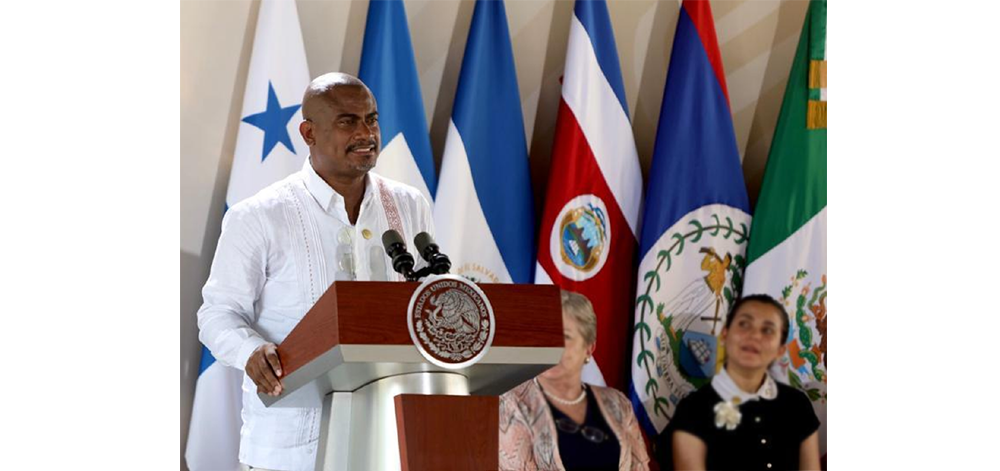Photo: DPM Cordel Hyde speaks at closing press conference for Mexico Migration Summit in Palenque, Chiapas, Mexico
PALENQUE, CHIAPAS, Mexico, Sun. Oct. 22, 2023
Representatives from 10 countries in Latin America and the Caribbean participated today in a first Mexico Migration Summit in Palenque, Chiapas, the southernmost state of Mexico. At its conclusion, it was agreed that a migration action plan would be developed based on the realities of each impacted country to address the structural causes of migration. The leaders emphasized the need for a shared response of the countries of origin, transit, destination and return for migrants. In the joint 13-point declaration which was signed at the conclusion of the summit, the countries emphasized the need for a human rights approach in the face of unprecedented, increasing migration flows from South America to the United States.
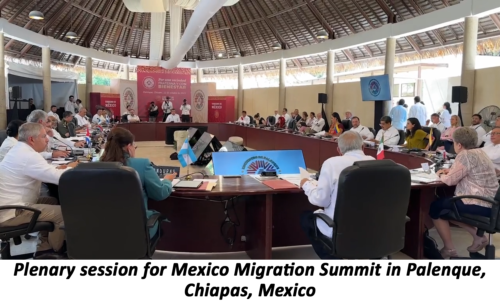
The countries represented were Belize, Haiti, Cuba, Colombia, Costa Rica, El Salvador, Honduras, Mexico, Panama and Venezuela. The presidents of Cuba, Haiti, Mexico and Venezuela were in attendance. Belize was represented by Deputy Prime Minister Hon. Cordel Hyde.
Colombian president Gustavo Petro announced that there will be a follow-up conference of presidents of the wider Latin America and the Caribbean in Colombia in February next year to deepen the discussion which started today in order to arrive at a common regional migration policy.
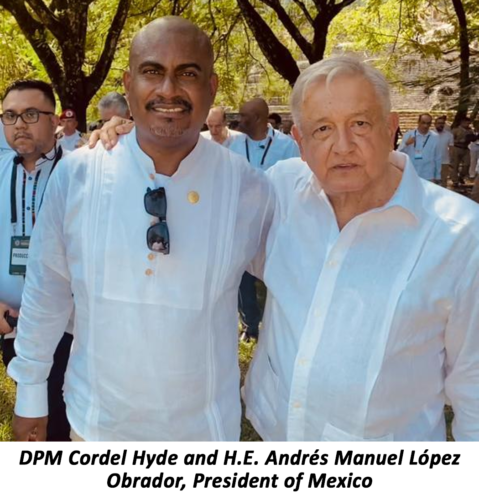
As read by the Foreign Minister of Mexico, H.E. Alicia Bárcena, the joint declaration at point 4 says the leaders “urge countries of origin, transit and destination to implement comprehensive migration policies that respect the human right to migrate, safeguarding the life and dignity of migrants and their families, and including the promotion of permanent regularization options that allow contributions of diasporas in their communities of origin and destination to be enhanced.”
Based on latest online migration data, so far in 2023, 1.7 million migrants have reached the U.S.-Mexico border. The majority last month was from Venezuela, followed by Guatemala then Honduras. According to the International Organization on Migration, in 2020, close to 59 million migrants were residing in North America from a variety of regions. Of that number, some 26 million are from Latin America and the Caribbean.
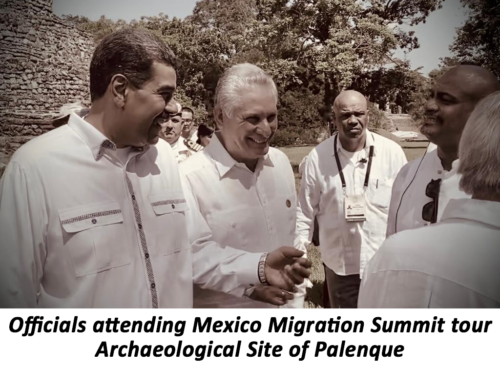
VOA News has described the U.S.-Mexico border as the world’s deadliest land crossing for migrants. However, at the summit, the dangers for migrant traffic through the deadly Darién Gap was highlighted. The Darién Gap connects South America with Central America. It is described as a swath of undeveloped forest and wetlands 160 kilometers long which spans Colombia’s northern Chocó Department and Panama’s Darién Province. According to the Foreign Minister of Panama, H.E. Janaina Tewaney, speaking at the closing conference of the summit, to date, 445,000 migrants have arrived at the Darien Gap. Her Colombian counterpart, Álvaro Leyva Durán remarked, “We know what the mafias do … how they disappear children, how they rape women, how they hang [them] on the trees … It is a horrible, sinful industry.” Reports are that traffickers trick people, saying it would only take two days to traverse the Dárien Gap, when in reality the trek lasts 8 days, and scores of migrants end up meeting their deaths there. Many are preyed upon by paramilitary groups and criminal gangs.
Without naming the United States, the countries also called on destination countries to adopt migratory policies and practices in line with the actual reality of the region and to abandon those which are inconsistent and selective. For instance, in the case of Cuba, it was highlighted that privileged treatment is offered to Cuban migrants once they reach the border of the United States; and once inside, they can regularize their status within a year – something alien to other migrants. At the same time, the longstanding, inhumane economic blockade of the U.S. on Cuba is a stimulus to migration. In this regard, the countries represented at the summit today proposed that the governments of Cuba and the United States hold, as soon as possible, a comprehensive dialogue on their bilateral relations.
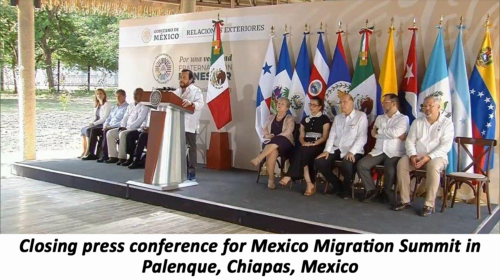
One country where migration has drastically reduced is El Salvador. Foreign Minister, H.E. Félix Ulloa shared that when President Nayib Bukele came to power, some 300 migrants were leaving the country daily. Ulloa declared that with the changes in tackling gangs and promoting the resurgence of agriculture, only 30 deportees arrived in El Salvador in the last flight as opposed to hundreds that would be sent back in the past.
In order to meet the goals underscored at the summit, and recognizing that the drivers of migration are political, economic and social as well as climate change, Mexico committed to make available technical expertise through different development programs it has brought to other Latin American countries and the Caribbean, including the agriculture project, Sembrando Vida and Youth Building the Future.
DPM Hyde, at the concluding press conference, welcomed the regional summit, which he said allows the impacted countries to address the issue of migration via a unified approach. He said, “Oftentimes, we grapple with issues on our own, and that’s when we fall woefully short of our goals; but if we work together, and we coordinate our efforts and bring all our resources, all our talents, all our mental capacity, all our energies, together, then we are able to take on any problem in the region. Our regional problems require regional solutions, and so I’m just very, very thankful to President AMLO for his leadership, for his generosity, for bringing us together so that we can deal with the issues – deal with it frontally, honestly, frankly … I think it is the spirit of unity, the spirit of working together that bodes well for the future.”
As per the Palenque Declaration, areas to be prioritized so as to reduce migration are food security via self-sufficiency and sovereignty of the countries where migrants originate; the protection, conservation and restoration of the environment; dignified employment; education and the development of technical capacities; energy security, including renewable energy and progress in the move away from fossil fuels; self-sufficiency in health; and intra-regional commerce and investment for socio-economic development; combating transnational crime, human trafficking, corruption and fomenting cooperation in security. Importantly, the leaders also agreed to support Haiti in its efforts to normalize the social, political and economic situation on the ground.
Colombian President Petro described today’s migration reality as one of the most serious issues facing humanity, which sees many human beings who have not committed a crime, end up losing their freedom, jailed in concentration camps. He says the goal is to chart a new way forward, and affirmed, “If in the north, they don’t want to receive people who ethnically, racially, culturally are not like them, that is, establishing a new, like in the year 33, a xenophobic policy there, then the best way out is to build progress in the south and not to build concentration camps at the border …”
Along with DPM Hyde in the Belize delegation was his CEO, Paul Thompson; Immigration CEO, Dr. Gilroy Middleton; and Belize Ambassador to Mexico, H.E. Oscar Arnold.

